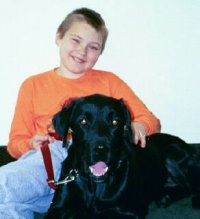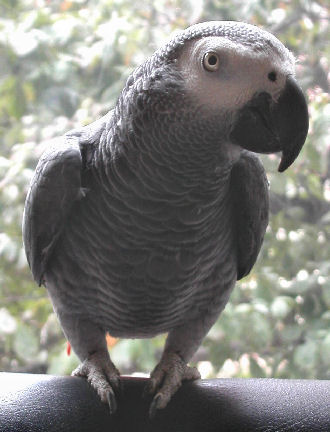May 6th 2006
Animal Radio® welcomes the Pet Vision Network - in pet stores
nationwide.
Today, Do animals feel?
Time to Discard Descartes
Rae Ann Kumelos,
Voice of the Animal
 The 17th century philosopher of
Rene Descartes toward the animal world has had horrific long-range
effects on the way society has treated animals. From factory farms
to product testing, animals are still treated as machines based
upon this philosophy of bad science and incorrect assumptions.
But, things are changing learn how the language of rats,
monkeys and whales is shaping the philosophy of the future.
The 17th century philosopher of
Rene Descartes toward the animal world has had horrific long-range
effects on the way society has treated animals. From factory farms
to product testing, animals are still treated as machines based
upon this philosophy of bad science and incorrect assumptions.
But, things are changing learn how the language of rats,
monkeys and whales is shaping the philosophy of the future.
Do Animals Enjoy Life?
Jonathan Balcombe, Ph.D.,
Pleasurable Kingdom: Animals and the Nature of Feeling Good
 The
recognition of animal pain and stress, once controversial, is
now acknowledged by legislation in many countries, but there is
no formal recognition of animals' ability to feel pleasure. Pleasurable
Kingdom is the first book for lay-readers to present new evidence
that animals--like humans--enjoy themselves. It debunks the popular
perception that life for most is a continuous, grim struggle for
survival and the avoidance of pain. Instead it suggests that creatures
from birds to baboons feel good thanks to play, sex, touch, food,
anticipation, comfort, aesthetics, and more. Combining rigorous
evidence, elegant argument and amusing anecdotes, leading animal
behavior researcher Jonathan Balcombe proposes that the possibility
of positive feelings in creatures other than humans has important
ethical ramifications for both science and society.
The
recognition of animal pain and stress, once controversial, is
now acknowledged by legislation in many countries, but there is
no formal recognition of animals' ability to feel pleasure. Pleasurable
Kingdom is the first book for lay-readers to present new evidence
that animals--like humans--enjoy themselves. It debunks the popular
perception that life for most is a continuous, grim struggle for
survival and the avoidance of pain. Instead it suggests that creatures
from birds to baboons feel good thanks to play, sex, touch, food,
anticipation, comfort, aesthetics, and more. Combining rigorous
evidence, elegant argument and amusing anecdotes, leading animal
behavior researcher Jonathan Balcombe proposes that the possibility
of positive feelings in creatures other than humans has important
ethical ramifications for both science and society.
http://www.ovc.uoguelph.ca/associations/awc/2005/Balcombe.html
Do Dogs Think and Feel?
Dr. Stanley Coren
How Dogs Think: What the World Looks Like to Them and Why They
Act the Way They Do
 Bestselling
author, psychologist, and world-renowned expert on dog behavior
and training Dr. Stanley Coren presents the most informative,
in-depth, fascinating book yet on dogs with numerous funny, informative
anecdotes, experiments, and firsthand observations. It lets you
see through a dog's eyes, hear through his ears, and even sense
the world through his nose. How Dogs Think also answers
questions about our canine companions that have puzzled many:
Do dogs feel guilt? Do they have an appreciation of art or music?
Can a dog learn how to do something just by watching another dog
or even a person do it? Do dogs dream? What is the nature of dog
personality? Which behaviors are prewired into your dog, and which
can you actually change? And, can dogs actually sense future earthquakes
or detect cancer? Find out the answers to these questions and
more.
Bestselling
author, psychologist, and world-renowned expert on dog behavior
and training Dr. Stanley Coren presents the most informative,
in-depth, fascinating book yet on dogs with numerous funny, informative
anecdotes, experiments, and firsthand observations. It lets you
see through a dog's eyes, hear through his ears, and even sense
the world through his nose. How Dogs Think also answers
questions about our canine companions that have puzzled many:
Do dogs feel guilt? Do they have an appreciation of art or music?
Can a dog learn how to do something just by watching another dog
or even a person do it? Do dogs dream? What is the nature of dog
personality? Which behaviors are prewired into your dog, and which
can you actually change? And, can dogs actually sense future earthquakes
or detect cancer? Find out the answers to these questions and
more.
http://www.StanleyCoren.com
Monkey See Monkey Do
Britt Savage
 A study has shown that Chimpanzees
can learn from other chimpanzees with human absence. When a group
of Chimpanzees were taught a task and later put with other chimpanzees,
those chimpanzees observed and mimicked the actions of the original
chimpanzees, without being taught directly.
A study has shown that Chimpanzees
can learn from other chimpanzees with human absence. When a group
of Chimpanzees were taught a task and later put with other chimpanzees,
those chimpanzees observed and mimicked the actions of the original
chimpanzees, without being taught directly.
Better Behaved Pets?
Dr. Jim Humphries,
Veterinary News Network
People with anxious pets eagerly seek out anything that might
reduce the barking, howling, chewing and house-soiling. Many have
tried the recently introduced products containing pheromones.
These are sprays and plug-ins aimed at calming anxious pets. Separation
anxiety affects 15% of the nation's 74 million dogs. Separation
anxiety also affects cats, although it's not as noticeable, as
cats tend to be less noisy and destructive when they express anxiety.
Veterinarians see a lot of dogs with separation anxiety, and firework
and thunderstorm phobias. Anxiety is an underlying issue in a
significant portion of aggression also. So just how much do these
pheromone based products help? It's debatable. Used in combination
with behavior modification and on selected cases, they may have
some usefulness. Could pheromone therapy help your pet?
http://www.VetNewsNet.com
Songbirds Can Learn Grammar
 Calling someone a "bird brain"
may lose some of its sting.
Calling someone a "bird brain"
may lose some of its sting.
It turns out a common songbird can learn
grammar, according to a study in the journal Nature. The paper
says starlings learned to tell the difference between a regular
birdsong "sentence" and one containing a clause or another
sentence.
A University of California at San Diego
psychology researcher said it took a month and about 1,500 training
attempts to get the birds to recognize the most basic grammar.
The results could shake up the field of linguistics. Researchers
had figured only humans can recognize sentences that include an
explanatory clause.
The professor's training led nine of 11
songbirds to pick out the songs with inserted phrases about 90
percent of the time. The other two flunked grammar.
Another UC San Diego professor, who wasn't
part of the study, said the findings show the complexity of language
and animal thought.
 Do
Animals Have Emotions?
Do
Animals Have Emotions?
Susan B. Eirich,
Ph.D., Earthfire Institute
From a behavioral perspective it only makes sense that animals
would experience emotions. If we accept that animals feel emotion,
the next question is, are they aware of them?
Any issue about animals can be looked
at from a variety of levels; scientific, emotional, artistic,
intuitive/experiential, spiritual. What we believe, and perhaps
know, depends on what evidence we accept as valid - science for
some, intuition for others. From their point of view, pet owners
always knew their pets felt emotions. Researchers into the relationship
between people and their pets have asked some interesting questions.
For example how is it that dogs know when their owners are coming
home? What sense are they using? Some carefully controlled and
provocative studies have been done on this matter, and suggest
the easiest explanation is a sort of seventh sense, almost a form
of telepathy. This seventh sense is most frequently activated
in the context of strong emotion. It is most common between mothers
and children and between pets and owners where there is a close
love relationship - a mysterious communication facilitated by
the emotion of love. And then we must ask the question - if dogs
and cats can feel love, and loss...doesn't it logically follow
that other animals can too?
Susan B. Eirich, Ph.D. a biologist and
licensed psychologist, is Director of Earthfire Institute, a non-profit
organization in Driggs, Idaho. A home for native wildlife that
can never be released into the wild, Earthfire and its animals
offer nature education for all ages, including biology, art, emotions
and spirit. A focus of all programs is wildlife habitat preservation.
earthfire@ida.net or 208-456-0926
http://www.EarthFireInstitute.org
Talk With Your Animals
Joy Turner
Joy talks to Grayson, a 20-year-old cat that has passed away.
Grayson assures his guardian that he no longer is the old and
ailing cat he was when he passed. He assures her that he no longer
feels any pain, and that when you pass over, you can chose the
age you would like to remain.
http://www.TalkWithYourAnimals.com
Designer Dogs - No Guarantee of a Perfect
Dog
Stephanie Shain,
HSUS
 The names and faces may be irresistible,
but the trendiest dogs hybrid or "designer" dogs
like Puggles (Pugs and Beagles) and Labradoodles (Labradors and
Poodles) are far from perfect. Those who profit from these newly
designed dogs tout that by breeding two different purebred dogs,
they create a new breed that possesses all of the positives but
not any of the challenges from each breed.
The names and faces may be irresistible,
but the trendiest dogs hybrid or "designer" dogs
like Puggles (Pugs and Beagles) and Labradoodles (Labradors and
Poodles) are far from perfect. Those who profit from these newly
designed dogs tout that by breeding two different purebred dogs,
they create a new breed that possesses all of the positives but
not any of the challenges from each breed.
But the truth is that these dogs are not
protected from genetic diseases, they are just as likely to have
the same problems that other puppies have who come from large-scale,
high-volume breeding, especially since the demand is massive and
puppy mills are responding by pumping out the hybrid-du-jour as
quickly as possible.
In fact, there are many dogs who fit the
bill of "Designer Dogs" at your local shelter just waiting
for a home.
http://www.HSUS.org
Skunk - A Reputation to Respect
Rae Ann Kumelos,
Voice of the Animal
 This true story about the rescue
and relocation of an amiable skunk is a reminder that respect
and reputation involve more than just noble intention.
This true story about the rescue
and relocation of an amiable skunk is a reminder that respect
and reputation involve more than just noble intention.
http://www.VoiceOfTheAnimal.org
 Autism
Assistance Dog
Autism
Assistance Dog
Karen Shirk, 4 Paws
For Ability
4 Paws was the first agency to begin placing skilled Autism Assistance
Dogs and continues to be the largest organization in the United
States and the only organization placing in other Countries Autism
Assistance Dogs with tracking. Having placed well over 50 Autism
Assistance Dogs, this type of dog continues to be the most requested
and most often placed dog of all of our services. As the founding
agency of Autism Assistance Dogs with tracking we continue to
provide the highest quality of dogs to every child that applies.
4 Paws, unlike almost every other agency does not pick and choose
who's child will get a dog. As long as the child's physician approves
the dog and it is safe to place a dog in the home, no family is
turned away. We continue our services with no long waiting lists
and continue as always to "partner" with our families
to provide the dog their child needs. In addition, our online
group for 4 Paws Families has a membership of 80+ dogs.
Hear how these special dogs react to these
special needs children.
http://www.4PawsForAbility.org
Alex the Counting Parrot
Dr. Irene Pepperberg,
Alex Foundation
 Dr. Pepperberg and Alex, an African
Grey parrot, have been together since June of 1997. Alex can now
label seven colors, is learning the alphabet and can count up
to six objects. Evidence has been established which indicates
that parrots are highly social and sentient beings, fully aware
of their surroundings.
Dr. Pepperberg and Alex, an African
Grey parrot, have been together since June of 1997. Alex can now
label seven colors, is learning the alphabet and can count up
to six objects. Evidence has been established which indicates
that parrots are highly social and sentient beings, fully aware
of their surroundings.
Dr. Pepperberg has developed training
techniques that enable Grey parrots not only to produce but also
comprehend and use English speech appropriately. She has also
shown that these birds can perform as well as chimpanzees and
dolphins on many tasks used to evaluate intelligent behavior.
http://www.AlexFoundation.org
Temperament Testing
Mike Fry, Animal
Ark Shelter and Host of Animal Wise Radio
Mike Fry takes a look at the unfair
practice of temperament testing, which is how most shelters determine
whether a dog is considered adoptable or not.
http://www.AnimalArkShelter.org
Listen to the 1/2 Hour ABRIDGED VERSION Podcast of this
show (#336).
 View Animal Radio
Network® Broadcast Schedule in a new window.
View Animal Radio
Network® Broadcast Schedule in a new window.
 Listen
to Animal Radio®
- Go to the launch page
Listen
to Animal Radio®
- Go to the launch page
 Return to Animal Radio Network®
Home Page
Return to Animal Radio Network®
Home Page
Copyright 2006
All Rights Reserved Animal Radio Network LLC
 The 17th century philosopher of
Rene Descartes toward the animal world has had horrific long-range
effects on the way society has treated animals. From factory farms
to product testing, animals are still treated as machines based
upon this philosophy of bad science and incorrect assumptions.
But, things are changing learn how the language of rats,
monkeys and whales is shaping the philosophy of the future.
The 17th century philosopher of
Rene Descartes toward the animal world has had horrific long-range
effects on the way society has treated animals. From factory farms
to product testing, animals are still treated as machines based
upon this philosophy of bad science and incorrect assumptions.
But, things are changing learn how the language of rats,
monkeys and whales is shaping the philosophy of the future. The
recognition of animal pain and stress, once controversial, is
now acknowledged by legislation in many countries, but there is
no formal recognition of animals' ability to feel pleasure. Pleasurable
Kingdom is the first book for lay-readers to present new evidence
that animals--like humans--enjoy themselves. It debunks the popular
perception that life for most is a continuous, grim struggle for
survival and the avoidance of pain. Instead it suggests that creatures
from birds to baboons feel good thanks to play, sex, touch, food,
anticipation, comfort, aesthetics, and more. Combining rigorous
evidence, elegant argument and amusing anecdotes, leading animal
behavior researcher Jonathan Balcombe proposes that the possibility
of positive feelings in creatures other than humans has important
ethical ramifications for both science and society.
The
recognition of animal pain and stress, once controversial, is
now acknowledged by legislation in many countries, but there is
no formal recognition of animals' ability to feel pleasure. Pleasurable
Kingdom is the first book for lay-readers to present new evidence
that animals--like humans--enjoy themselves. It debunks the popular
perception that life for most is a continuous, grim struggle for
survival and the avoidance of pain. Instead it suggests that creatures
from birds to baboons feel good thanks to play, sex, touch, food,
anticipation, comfort, aesthetics, and more. Combining rigorous
evidence, elegant argument and amusing anecdotes, leading animal
behavior researcher Jonathan Balcombe proposes that the possibility
of positive feelings in creatures other than humans has important
ethical ramifications for both science and society. Bestselling
author, psychologist, and world-renowned expert on dog behavior
and training Dr. Stanley Coren presents the most informative,
in-depth, fascinating book yet on dogs with numerous funny, informative
anecdotes, experiments, and firsthand observations. It lets you
see through a dog's eyes, hear through his ears, and even sense
the world through his nose. How Dogs Think also answers
questions about our canine companions that have puzzled many:
Do dogs feel guilt? Do they have an appreciation of art or music?
Can a dog learn how to do something just by watching another dog
or even a person do it? Do dogs dream? What is the nature of dog
personality? Which behaviors are prewired into your dog, and which
can you actually change? And, can dogs actually sense future earthquakes
or detect cancer? Find out the answers to these questions and
more.
Bestselling
author, psychologist, and world-renowned expert on dog behavior
and training Dr. Stanley Coren presents the most informative,
in-depth, fascinating book yet on dogs with numerous funny, informative
anecdotes, experiments, and firsthand observations. It lets you
see through a dog's eyes, hear through his ears, and even sense
the world through his nose. How Dogs Think also answers
questions about our canine companions that have puzzled many:
Do dogs feel guilt? Do they have an appreciation of art or music?
Can a dog learn how to do something just by watching another dog
or even a person do it? Do dogs dream? What is the nature of dog
personality? Which behaviors are prewired into your dog, and which
can you actually change? And, can dogs actually sense future earthquakes
or detect cancer? Find out the answers to these questions and
more. A study has shown that Chimpanzees
can learn from other chimpanzees with human absence. When a group
of Chimpanzees were taught a task and later put with other chimpanzees,
those chimpanzees observed and mimicked the actions of the original
chimpanzees, without being taught directly.
A study has shown that Chimpanzees
can learn from other chimpanzees with human absence. When a group
of Chimpanzees were taught a task and later put with other chimpanzees,
those chimpanzees observed and mimicked the actions of the original
chimpanzees, without being taught directly. Calling someone a "bird brain"
may lose some of its sting.
Calling someone a "bird brain"
may lose some of its sting. Do
Animals Have Emotions?
Do
Animals Have Emotions? The names and faces may be irresistible,
but the trendiest dogs hybrid or "designer" dogs
like Puggles (Pugs and Beagles) and Labradoodles (Labradors and
Poodles) are far from perfect. Those who profit from these newly
designed dogs tout that by breeding two different purebred dogs,
they create a new breed that possesses all of the positives but
not any of the challenges from each breed.
The names and faces may be irresistible,
but the trendiest dogs hybrid or "designer" dogs
like Puggles (Pugs and Beagles) and Labradoodles (Labradors and
Poodles) are far from perfect. Those who profit from these newly
designed dogs tout that by breeding two different purebred dogs,
they create a new breed that possesses all of the positives but
not any of the challenges from each breed. This true story about the rescue
and relocation of an amiable skunk is a reminder that respect
and reputation involve more than just noble intention.
This true story about the rescue
and relocation of an amiable skunk is a reminder that respect
and reputation involve more than just noble intention. Autism
Assistance Dog
Autism
Assistance Dog Dr. Pepperberg and Alex, an African
Grey parrot, have been together since June of 1997. Alex can now
label seven colors, is learning the alphabet and can count up
to six objects. Evidence has been established which indicates
that parrots are highly social and sentient beings, fully aware
of their surroundings.
Dr. Pepperberg and Alex, an African
Grey parrot, have been together since June of 1997. Alex can now
label seven colors, is learning the alphabet and can count up
to six objects. Evidence has been established which indicates
that parrots are highly social and sentient beings, fully aware
of their surroundings.